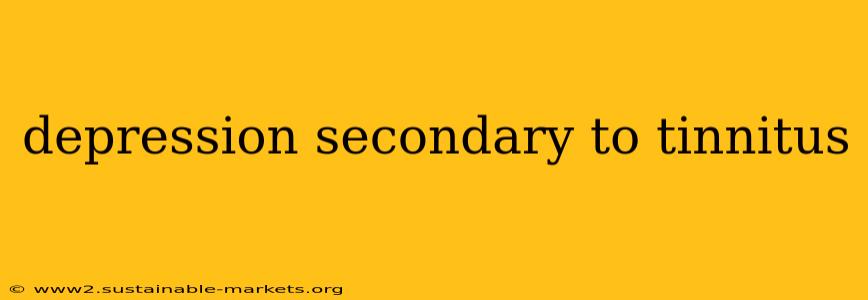Tinnitus, that persistent ringing, buzzing, or hissing in the ears, is more than just a nuisance for many. For a significant number of sufferers, it becomes a debilitating condition, leading to secondary depression and significantly impacting quality of life. This article explores the complex relationship between tinnitus and depression, examining the causes, symptoms, and available treatment options.
The Link Between Tinnitus and Depression: A Vicious Cycle
The connection between tinnitus and depression isn't simply correlational; it's often a cyclical relationship. The constant, intrusive sound of tinnitus can be incredibly stressful and frustrating, leading to sleep disturbances, irritability, difficulty concentrating, and ultimately, depression. This, in turn, can worsen tinnitus perception, creating a vicious cycle that's difficult to break.
Several factors contribute to this link:
- Sleep Deprivation: Tinnitus often disrupts sleep, leading to fatigue and exacerbating depressive symptoms. The lack of restorative sleep further amplifies the perceived loudness and annoyance of the tinnitus.
- Cognitive Changes: The constant auditory input of tinnitus can lead to cognitive difficulties, including problems with memory, concentration, and attention. These cognitive challenges can contribute to feelings of frustration, helplessness, and hopelessness, all hallmarks of depression.
- Emotional Distress: The unrelenting nature of tinnitus can cause significant emotional distress, leading to anxiety, anger, frustration, and feelings of isolation. These negative emotions are strongly associated with the development and maintenance of depression.
- Social Isolation: The debilitating effects of tinnitus can lead to social withdrawal, further isolating individuals and intensifying feelings of loneliness and despair. This isolation can significantly worsen depressive symptoms.
- Reduced Quality of Life: The impact of tinnitus on daily life, including work, social activities, and relationships, can lead to a diminished sense of well-being and contribute to the development of depression.
Recognizing the Symptoms: Tinnitus-Related Depression
Identifying depression secondary to tinnitus is crucial for effective treatment. While the symptoms of tinnitus are readily apparent (the perceived sound), the symptoms of depression can be more subtle and varied. Look for these signs:
- Persistent sadness or low mood: A prolonged feeling of unhappiness that doesn't easily lift.
- Loss of interest or pleasure: A significant decrease in enjoyment of previously pleasurable activities.
- Changes in appetite or weight: Noticeable weight loss or gain, or changes in eating habits.
- Sleep disturbances: Insomnia, excessive sleeping, or restless sleep.
- Fatigue or loss of energy: Persistent tiredness and lack of motivation.
- Feelings of worthlessness or excessive guilt: Negative self-perception and self-blame.
- Difficulty concentrating or making decisions: Impaired cognitive function.
- Recurrent thoughts of death or suicide: Serious consideration of self-harm or ending one's life.
Treatment Approaches: Breaking the Cycle
Fortunately, effective treatments exist to manage both tinnitus and secondary depression. A multi-faceted approach is often most successful:
1. Tinnitus Management:
- Sound Therapy: Techniques like white noise generators, hearing aids, and tinnitus maskers can help reduce the perceived intensity of tinnitus.
- Cognitive Behavioral Therapy (CBT): CBT helps individuals develop coping mechanisms to manage the emotional distress associated with tinnitus.
- Relaxation Techniques: Stress reduction techniques like meditation, deep breathing exercises, and yoga can help manage tinnitus symptoms and reduce anxiety.
- Hearing Protection: Protecting your ears from further damage is crucial in preventing tinnitus worsening.
2. Depression Treatment:
- Antidepressant Medication: In some cases, antidepressants may be prescribed to alleviate depressive symptoms.
- Therapy: Psychotherapy, particularly CBT, can be highly effective in addressing the emotional and cognitive aspects of depression.
- Lifestyle Changes: Regular exercise, a healthy diet, sufficient sleep, and stress management techniques can significantly improve mood and overall well-being.
Seeking Professional Help: The Importance of Early Intervention
If you're struggling with tinnitus and experiencing symptoms of depression, it's crucial to seek professional help. Early intervention can significantly improve outcomes and prevent the condition from becoming chronic. Consult your doctor or a mental health professional to discuss your symptoms and explore appropriate treatment options. Don't suffer in silence – help is available. Your quality of life is worth fighting for.
Disclaimer: This article is intended for informational purposes only and does not constitute medical advice. It is essential to consult with a qualified healthcare professional for diagnosis and treatment of tinnitus and depression.

